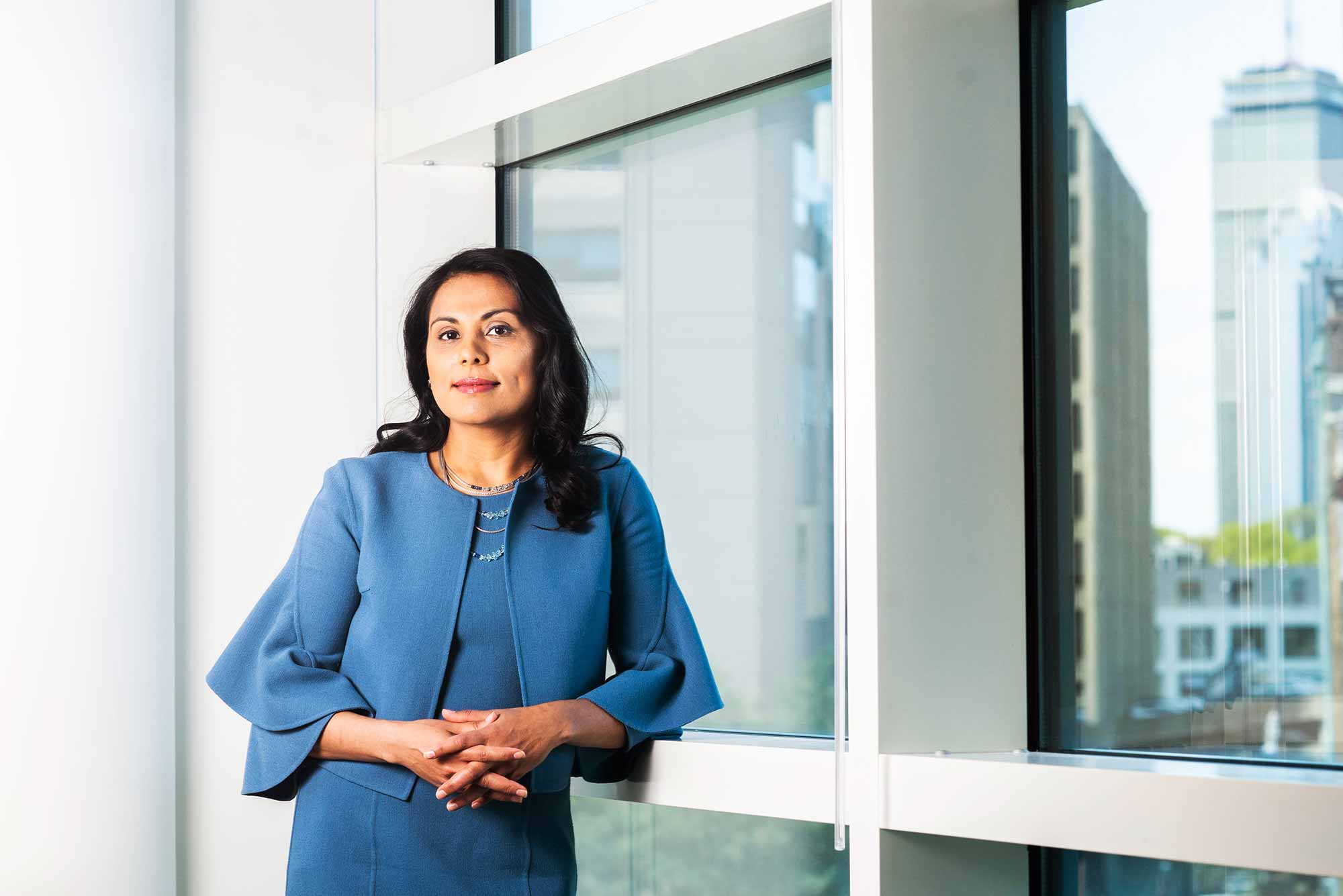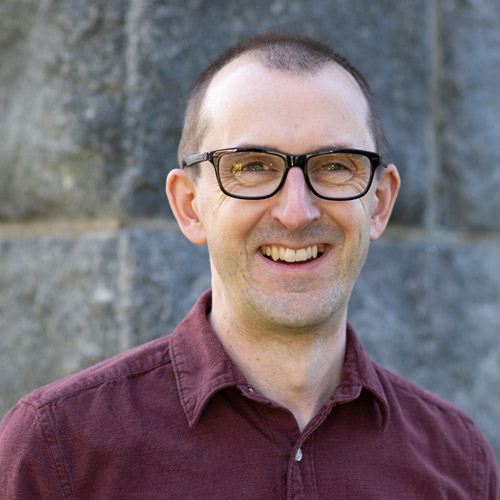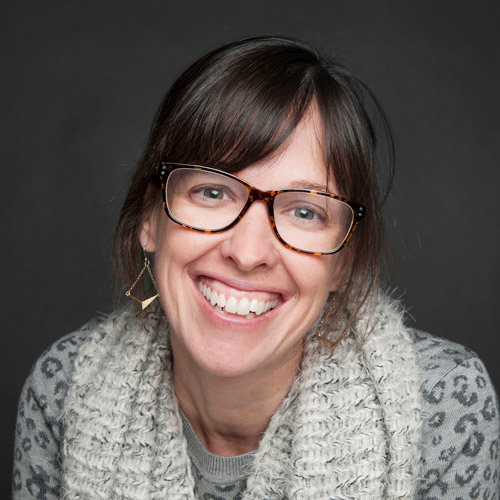After a Year in the White House, BU Infectious Diseases Expert Shares Lessons about Pandemic Response

After a Year in the White House, BU Infectious Diseases Expert Shares Lessons about Pandemic Response
Nahid Bhadelia has returned to BU after helping lead the Biden administration’s COVID-19 pandemic response and advising on preparing the world for future outbreaks
Having a desk in the Eisenhower Executive Office Building—part of the White House complex—guarantees some high-caliber coworkers. Vice President Kamala Harris and National Security Advisor Jake Sullivan both have offices there, among other senior officials.
For the past year, the 135-year-old building was also the workplace of Boston University infectious diseases physician Nahid Bhadelia. She recently returned to Boston after serving on the White House COVID-19 Response Team, formed by President Biden’s administration to unify the government’s pandemic actions and recovery efforts. As senior policy advisor for global COVID response, Bhadelia helped lead the federal drive to boost worldwide vaccination levels, accelerate vaccine and treatment innovation, and prepare for future outbreaks.
Bhadelia has extensive international and on-the-ground experience, serving as a member of the World Health Organization’s Technical Advisory Group for Universal Health and Preparedness Review, working in West and East Africa during multiple Ebola virus outbreaks, and contributing to pandemic preparedness in Liberia and Uganda. But she says that whenever she walked on the routes dividing the White House and the executive offices, the magnitude of what she was doing never failed to inspire.
“Every single time I walked into the compound, I needed to pinch myself,” says Bhadelia, a BU Chobanian & Avedisian School of Medicine associate professor of infectious diseases. She’s the founding director of the BU Center for Emerging Infectious Diseases Policy & Research (CEID), which works to improve international pandemic resilience. “The ability to potentially effect change on issues I’ve cared about my entire life, the awesome responsibility—and the humility—set in.”
Spurring New Vaccines, Sharing Current Ones
During her time with the Biden administration, Bhadelia cochaired the White House Steering Committee for Pandemic Innovation, helping write a report on the nation’s pandemic preparedness progress. She and her coauthors praised the country for taking big steps forward, but said “numerous gaps exist in the nation’s ability to respond and prepare for emerging health threats.” The report recommended a series of moves the country should make to fast-track therapeutic products, advance data collection and analysis, prepare for surge healthcare staffing needs, and more.
“The other thing I worked closely on was looking at how we get next-generation COVID vaccines and treatments into development and get them to the American people,” says Bhadelia, who was the COVID-19 team policy lead on Project Next Gen, a $5 billion Department of Health and Human Services push to spur new vaccines and treatments. “Our current vaccines help save lives, but immunity, particularly against infections, fades over time. We need broader vaccines that are variant-proof and we want to invest in vaccines that can block transmission.”
The government hopes that new vaccine technologies will bring benefits beyond COVID-19, leading to stronger barriers against other viruses, from influenza to RSV (respiratory syncytial virus).
Bhadelia also helped coordinate the United States’ international vaccine donation efforts—the government has sent close to 700 million COVID-19 doses to 117 countries. “Vaccine equity is something I and CEID advocated for extensively before I took the position,” she says. “I’ve spoken about how the speed of vaccine global equity and coverage in pandemics impacts how overwhelmed healthcare systems can become. Being able to do the work to address that inequity firsthand was immensely meaningful.” The majority of donated vaccines have gone to low- and lower-middle-income nations, including Bangladesh, Pakistan, Indonesia, and Vietnam.
“The most incredible part of this experience was realizing the scale at which you, in collaboration with others, have the ability to impact change in the world,” says Bhadelia, who was recruited by Ashish K. Jha, former White House COVID-19 response coordinator and managed a portfolio that included increasing access to COVID treatments around the world and improving surveillance against new SARS-CoV-2 variants. “The decisions that are made every day have this immense impact. The work that we did affected billions of lives.”
An Advocate for Continued Pandemic Investment
But getting vaccines delivered is just half of the problem—it doesn’t guarantee they’ll actually be used. Pakistan has been sent 79 million vaccine doses by the United States alone, but only 33 percent of its population has received at least one dose. Even with all the talk of vaccine skepticism in the United States, 80 percent of Americans have received at least one dose. To ensure vaccines make it into arms, countries need the infrastructure and expertise to properly store, transport, and give the vaccines, as well as the capability to counter vaccine misinformation.
In an interview with the Journal of the American Medical Association, Bhadelia said it was important that the United States continues to fund a global response to the pandemic—and help strengthen healthcare systems more broadly. “It’s ensuring that we are aiding our partners in low- and middle-income countries to build infrastructure for routine adult vaccination,” she told the journal. “Influenza vaccination almost doesn’t exist in many parts of the resource-limited world.”
These are among the challenges Bhadelia will continue tackling back in Boston with CEID. The center is currently backing studies examining misinformation and vaccine hesitancy in middle-income countries, public health literacy during pandemics, and international research collaboration during outbreaks, as well as training programs for disease experts in Liberia and a project to advance hospital laboratories and isolation units in East Africa. But one of the biggest issues will be making sure that the global community doesn’t fall into a “cycle of panic and neglect,” she says, responding to each new outbreak with a frenzy of reactionary activity without attempting to prevent or prepare for the next one.
“Centers like mine have the ability coming out of this crisis to serve as a memory reservoir, a place where intellectual capital can be sourced, so we don’t lose the experiences of the last three years,” says Bhadelia, who also helped found the Special Pathogens Unit at Boston Medical Center, BU’s primary teaching hospital. “We can be advocates for continued investment in pandemic preparedness and carry the lessons of this pandemic over.”
One of CEID’s primary goals is getting the latest infectious diseases science, research, data, and best practices into the hands of policymakers. This year, it’s launching four new core initiatives—pulling in experts from across the center and BU—focusing on different aspects of emerging infectious diseases, including climate change, trust and public health communications, data sciences and surveillance, and medical and public health preparedness. And Bhadelia says that her year working for the Biden administration has given her new insights into how the information she and her team provides is used—and how much noise it has to cut through.
“One of the big realizations I had in this position was how many competing priorities there are that are all important,” she says. “It’s given me a much more close-up knowledge about how our government works, how our agencies work, and why certain things, certain suggestions may work and others may not.”
Although Bhadelia has returned to Boston, other BU colleagues—including Joshua Goodman, a Wheelock College of Education & Human Development associate professor of education and economics, and Naomi M. Mann, a School of Law clinical associate professor of law—are still serving in temporary positions in the Biden administration. Bhadelia hopes students are inspired by their example—encouraging them to look for fellowships and other experiences in D.C.—and plans to pass on her insider’s view to them and her colleagues. CEID is also bringing White House and other experts to BU, hosting a forthcoming event on the nation’s response to monkeypox.
“I could give help in the middle of a crisis that matched my technical expertise,” says Bhadelia, who was also interim testing coordinator for the White House Monkeypox Response Team. “Even if you don’t want a career in government, use it [fellowships and other experiences] as a way of understanding how government works. It makes you more effective as somebody who is trying to share technical knowledge or solutions. It’s an incredible opportunity.”
On August 17, CEID and the BU Rafik B. Hariri Institute for Computing and Computational Science & Engineering will host Reflecting on One Year of MPOX Response. The hybrid event will feature Bhadelia and Jha, along with Demetre Daskalakis, White House monkeypox response deputy coordinator; Nikki Romanik, White House senior policy advisor; Adrianna Boulin, director of community impact and engagement at Fenway Health; and Céline Gounder, an editor-at-large at Kaiser Family Foundation Health News. Register online.


Comments & Discussion
Boston University moderates comments to facilitate an informed, substantive, civil conversation. Abusive, profane, self-promotional, misleading, incoherent or off-topic comments will be rejected. Moderators are staffed during regular business hours (EST) and can only accept comments written in English. Statistics or facts must include a citation or a link to the citation.